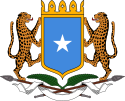
Abdiqasim Salad Hassan, also known as Abdiqasim Salad, is a Somali politician who served as the President of Somalia from 2000 to 2004. He helped found the Transitional National Government and previously served as Interior Minister and Finance Minister in the government of Siad Barre.
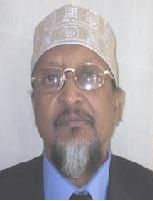
Hassan Abshir Farah was a Somali politician. He previously served as mayor of Mogadishu and interior minister of Puntland. From November 12, 2001 to November 8, 2003, he was also prime minister of Somalia. Farah was an MP in the Federal Parliament of Somalia.

Abdullahi Yusuf Ahmed was a Somali politician and former colonel in the Somali National Army. He was one of the founders of the Somali Salvation Democratic Front, as well as the Puntland state of Somalia, the latter of which he served as the first president. In 2004, Ahmed also helped establish the Transitional Federal Government, which he led as President of Somalia from 2004 until 2008.
Muse Sudi Yalahow born Mogadishu was a Trade Minister in the Transitional Government of Ali Mohammed Ghedi. He was dismissed in June 2006 after ignoring government requests to halt fighting with the Islamic Courts Union militia.

The Transitional Federal Government (TFG) was internationally recognized as a provisional government of the Republic of Somalia from 14 October 2004 until 20 August 2012, when its tenure officially ended and the Federal Government of Somalia was inaugurated.
Abdallah Deerow Isaaq, sometimes Abdullah Deerow Isaq, was a Somali politician. He served as the first Speaker of Parliament in the Transitional National Government of Somalia from 2000 to 2003, and was later the Minister of Constitutional and Federal Affairs in the Transitional Federal Government. He was assassinated in July 2006.

Ali Khalif Galaydh was a Somali politician. He was the Prime Minister of the transitional Somalia administration from 8 October 2000 to 28 October 2001. Galaydh had extensive experience in public policy, diplomacy, public administration, and business. He taught these subjects at public universities in the United States. Additionally, Galaydh was the president of the Khaatumo state. In 2017, he signed an agreement with the Somaliland government which stipulated the amendment of Somaliland's constitution, this would’ve promoted peace and stability throughout the regions of Sool, sanaag and cayn.
Following the civil war and the ensuing societal chaos, some factions managed to exert a degree of authority over certain regions of Somalia where they maintained broad, clan-based support. This allowed these factions to establish working administrations and eventually coherent states, and restored order to their regions. This occurred first in Puntland, Southwestern Somalia, Galmudug, Jubaland and finally Banadir.
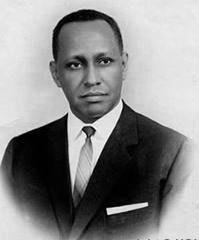
The Habar Gidir is a major subclan of the Hawiye. The clan has produced few prominent Somali figures, including the first Prime Minister of Somalia Abdullahi Issa Mohamud, and Somalia's fifth President Abdiqasim Salad Hassan who was also a figure in President Siyaad Barres government.

The transitional federal government (TFG) was the government of Somalia between 2004 and 2012. Established 2004 in Djibouti through various international conferences, it was an attempt to restore national institutions to the country after the 1991 collapse of the Siad Barre government and the ensuing Somali Civil War.
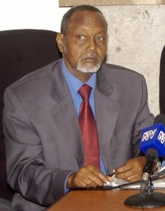
Colonel Hasan Muhammad Nur Shatigadud (1946-2013) was a Somali politician and faction leader. He served as the chairman of the Rahanweyn Resistance Army (RRA), and subsequently as the first President of the short-lived Southwestern Somalia autonomous regional state. Shatigadud was later a Member of the Transitional Federal Parliament, and was eventually appointed Minister of Finance in the Transitional Federal Government. Shatigadud was succeeded as president by Madobe Nunow.

The National Security Service (NSS) was the primary intelligence agency of the Somali Democratic Republic from 1970 to 1990. The NSS was formed as the secret police under the government of Siad Barre in 1970, modelled after the KGB of the Soviet Union, and was formally dissolved in 1990 shortly before Barre's overthrow. In 2013, the Federal Government of Somalia re-established the NSS as the national intelligence service, renaming it the National Intelligence and Security Agency (NISA).
After two decades of violence and civil war and after the Transitional Federal Government (TFG) of Somalia captured Mogadishu and Kismayo, the TFG attempted to disarm the militias of the country in late 2006. According to the UN/World Bank's Joint Needs Assessment (JNA) coordination secretariat, "the total estimated number of militias [militia members] to be demobilized is 53,000." In 2005, they estimated that "there are 11–15,000 militia people controlling Mogadishu ."
Mohamed Omar Habeb, commonly known as Mohamed Dheere or Mohamed Dhere, was a Somali faction leader based out of the city of Jowhar. He hailed from the Abgaal subclan of Hawiye. He also had significant influence on the northern parts of the capital Mogadishu where he controlled a militia of around 400 men.
Many factions opposed to Siad Barre set aside tribal and political differences to unite in purpose to overthrow his regime. After the collapse of Siad Barre's government in 1991 the nation fell into a long period of increasingly chaotic conflict between forces of clans, militias, warlords, separatist, religious functions and rebellion movements, other nations, and even the United Nations peacekeepers.
General Ismail Qasim Naji in Borama, Somalia was the chief of staff of the Transitional Federal Government (TFG) of Somalia and currently the Somali ambassador in Oman. He has served as a senior officer of the Somali army since the administration of Siad Barre, who was removed from power in 1991. Before the formation of the TFG, he also commanded the army of the predecessor Transitional National Government (TNG) of Somalia between 2002 and 2004.

Indirect presidential elections were held in Somalia on 30 January 2009. Due to the security situation in Baidoa, it was held in Djibouti. President Sharif Sheikh Ahmed won the election.
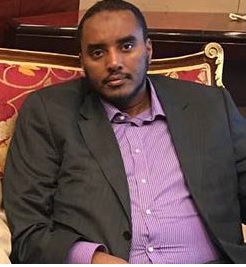
Fahad Yasin Haji Dahir,, commonly known only as Fahad Yasin, is a Somali civil servant and politician, as well as a former journalist. He was also the campaign manager for Mohamed Abdullahi Mohamed "Farmaajo" in the 2017 elections. After the elections, he was appointed Chief of Staff for Villa Somalia and then Director General of the National Intelligence and Security Agency (NISA). Farmaajo subsequently appointed him as his national security advisor.
The Political history of Somalia covers the development of the Somali government and institutional systems following the collapse of the Siad Barre regime in 1991.

